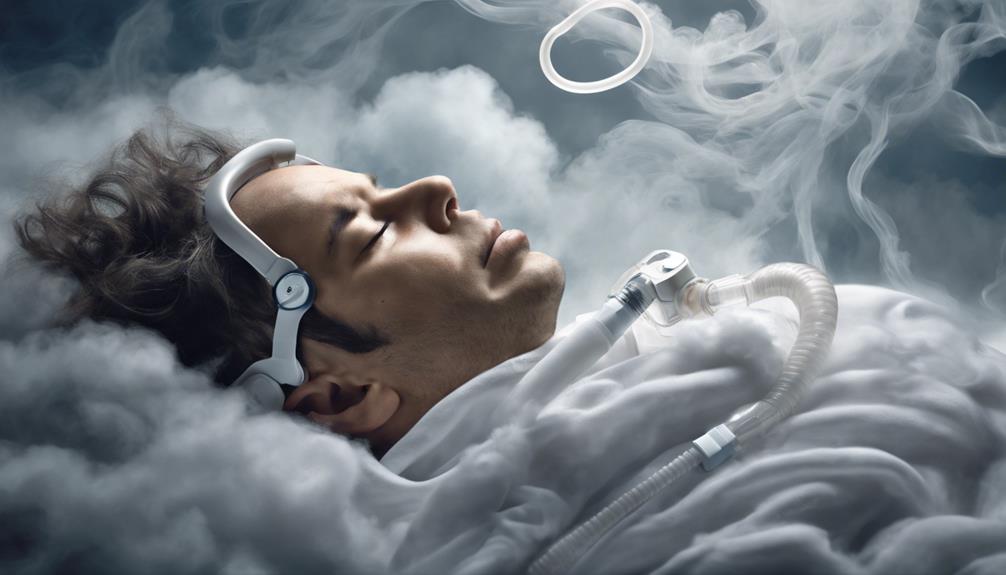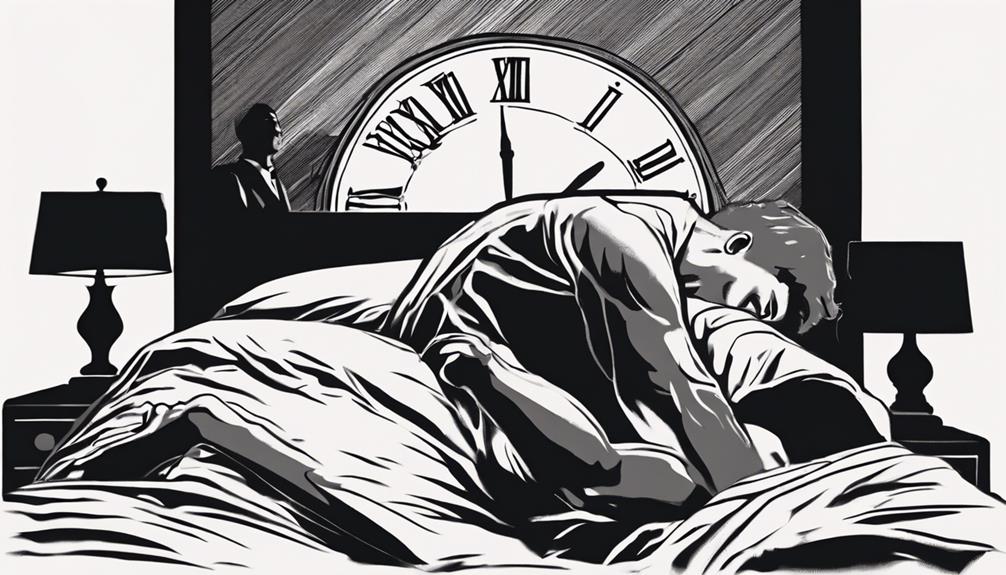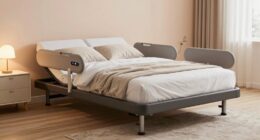Sleep apnea contributes to anxiety by causing sleep fragmentation, oxygen deprivation, elevated stress hormones, chronic fatigue, and health risks, all of which intensify anxiety levels. Interrupted breathing disrupts sleep, impacting anxiety. Oxygen shortage affects brain function and anxiety levels. High cortisol levels from poor sleep worsen anxiety. Fatigue and irritability heighten stress, exacerbating anxiety. Changes in the brain due to sleep apnea increase the risk of anxiety. Effective treatments such as CPAP can help alleviate anxiety symptoms. It is crucial to understand these five ways in which sleep apnea triggers anxiety in order to effectively manage both conditions.
Key Takeaways
- Sleep fragmentation from sleep apnea increases anxiety levels.
- Oxygen deprivation triggers stress response, worsening anxiety.
- Elevated cortisol levels due to poor sleep quality heighten anxiety.
- Chronic fatigue and irritability from sleep apnea intensify anxiety.
- Sleep apnea can lead to panic disorder, exacerbating anxiety.
Sleep Fragmentation and Anxiety
Sleep fragmentation in obstructive sleep apnea can significantly impact anxiety levels by disrupting sleep patterns and reducing sleep quality. When individuals experience interrupted breathing during sleep, it can lead to fragmented sleep, causing irritability, mood disturbances, and cognitive impairments, all of which can worsen anxiety symptoms. Additionally, these disruptions trigger the body's stress response, further heightening anxiety levels in those with sleep apnea. The bidirectional relationship between sleep apnea and anxiety suggests that both conditions can exacerbate each other over time. It's essential to address sleep fragmentation in obstructive sleep apnea to improve overall well-being and manage anxiety effectively.
To mitigate the effects of sleep fragmentation on anxiety, establishing a consistent sleep schedule, creating a calming bedtime routine, and optimizing sleep environment can be beneficial. Seeking treatment for sleep apnea, such as continuous positive airway pressure (CPAP) therapy, can also enhance sleep quality and reduce anxiety levels. By addressing sleep fragmentation and improving sleep quality, individuals with obstructive sleep apnea can better manage anxiety and enhance their overall quality of life.
Oxygen Deprivation and Anxiety

Fragmented sleep in obstructive sleep apnea not only disrupts sleep patterns but also contributes to oxygen deprivation, which can heighten anxiety levels. Oxygen deprivation during sleep apnea triggers the body's stress response, impacting brain function and neurotransmitter balance. This leads to physiological changes that increase the body's arousal response, potentially exacerbating anxiety symptoms. Addressing oxygen deprivation through sleep apnea treatment may help alleviate anxiety associated with the condition.
| Effects of Oxygen Deprivation in Sleep Apnea on Anxiety |
|---|
| – Triggers stress response |
| – Impacts brain function |
| – Disrupts neurotransmitter balance |
Understanding how oxygen deprivation influences anxiety levels is vital in managing sleep apnea-related anxiety. By recognizing the role of oxygen levels in the body's stress response and physiological changes, individuals can take steps to address these issues through appropriate treatment strategies. Prioritizing the management of oxygen deprivation can contribute to improving overall well-being and reducing anxiety symptoms associated with sleep apnea.
Stress Hormones and Anxiety
Exploring the impact of stress hormones on anxiety reveals an important connection to sleep apnea, as elevated cortisol levels contribute to heightened feelings of stress and anxiety in affected individuals. Sleep apnea disrupts normal sleep patterns, leading to poor sleep quality and increased stress hormone release, particularly cortisol. This heightened cortisol level can further exacerbate the body's stress response, impacting anxiety levels. The cycle of poor sleep quality and elevated cortisol levels in individuals with sleep apnea can greatly contribute to overall anxiety.
To manage anxiety related to sleep apnea, it's vital to address the root cause by effectively managing the condition. Seeking treatment for sleep apnea, such as continuous positive airway pressure (CPAP) therapy, can help regulate stress hormones and improve sleep quality. By managing sleep apnea effectively, individuals may experience a reduction in anxiety levels associated with elevated cortisol levels, ultimately leading to improved overall well-being.
Fatigue and Irritability Impact

Chronic fatigue and irritability caused by sleep apnea disrupt normal daily functioning and relationships, impacting anxiety levels. Sleep apnea, with its disrupted sleep patterns and resulting excessive daytime sleepiness, can lead to increased stress and worry, exacerbating anxiety symptoms. The fatigue stemming from sleep apnea makes it challenging to cope with everyday pressures, potentially intensifying feelings of anxiety. Additionally, the irritability that often accompanies sleep apnea-related fatigue can strain relationships and hinder daily activities, further contributing to elevated anxiety levels. Understanding how sleep apnea affects chronic fatigue and irritability is vital in managing anxiety effectively.
To mitigate the impact of fatigue and irritability on anxiety levels, it's essential to address the root cause – sleep apnea. Seeking treatment for sleep apnea can improve sleep quality, reduce fatigue, and alleviate irritability, thereby helping to lower anxiety levels. By prioritizing sleep health and implementing strategies to enhance sleep patterns, individuals can take significant steps towards managing anxiety symptoms associated with sleep apnea-induced fatigue and irritability.
Health Implications and Anxiety
An increased risk of developing panic disorder, a type of anxiety disorder, is observed in patients with sleep apnea. Studies suggest that the fragmented sleep patterns and daytime sleepiness associated with sleep apnea can contribute to heightened anxiety levels.
The intermittent hypoxemia and oxidative stress resulting from untreated sleep apnea may also play a role in the development of panic disorder. Moreover, structural brain alterations caused by sleep apnea could impact regions of the brain linked to anxiety disorders like panic disorder.
Addressing sleep apnea through effective treatments such as CPAP therapy can help alleviate symptoms of panic disorder and reduce overall anxiety levels. It's imperative for individuals with sleep apnea to recognize the potential health implications on their mental well-being and seek appropriate medical interventions to manage both their sleep apnea and anxiety effectively.
Taking proactive steps to address sleep apnea can lead to improved quality of life and better mental health outcomes.
Frequently Asked Questions
How Does Sleep Apnea Cause Anxiety?
Sleep apnea can cause anxiety by disrupting sleep patterns and leading to daytime fatigue, contributing to increased stress levels. Additionally, the intermittent drops in oxygen levels during apnea episodes can trigger oxidative stress, heightening the risk of anxiety disorders.
Untreated sleep apnea may also lead to structural brain changes that impact regions associated with anxiety, potentially worsening anxiety symptoms. Effective treatment like CPAP therapy can help alleviate anxiety by improving sleep quality and reducing stress on the body.
What Are the Consequences of Not Treating Sleep Apnea?
Neglecting treatment for sleep apnea can lead to severe consequences. Without intervention, the condition can worsen, impacting mental health.
Untreated sleep apnea may result in heightened anxiety levels, exacerbating symptoms and potentially leading to the development of anxiety disorders. The cycle of poor sleep quality, fatigue, and increased anxiety can greatly affect overall well-being.
Seeking treatment is essential to prevent these negative outcomes and maintain good health.
What Is the Most Serious Potential Consequence of Sleep Apnea?
The most serious potential consequence of sleep apnea is the increased risk of life-threatening heart and brain conditions.
When left untreated, sleep apnea can elevate the chances of heart attacks by 140%, raise the risk of stroke by 60%, and heighten the probability of coronary heart disease by 30%.
These statistics highlight the critical importance of addressing sleep apnea to safeguard against severe health complications. These statistics highlight the critical importance of addressing sleep apnea to safeguard against severe health complications. Untreated sleep apnea has been linked to an increased risk of heart disease, stroke, and other chronic conditions that can significantly impact quality of life. Additionally, the connection between sleep apnea and headache triggers underscores the need for timely diagnosis and targeted interventions to alleviate both sleep disturbances and recurrent pain symptoms.
What's the Life Expectancy of Someone With Sleep Apnea?
We can expect a reduced life expectancy of around 8 to 18 years in individuals with untreated severe sleep apnea. The risks of cardiovascular events and mortality increase with untreated sleep apnea.
Long-term complications like hypertension and heart disease can impact life expectancy. However, effective treatment such as CPAP therapy can improve life expectancy and reduce associated risks.
Regular monitoring and management of sleep apnea can help mitigate its impact on life expectancy.
Conclusion
To sum up, sleep apnea can have a significant impact on anxiety levels due to factors such as:
- Sleep fragmentation
- Oxygen deprivation
- Stress hormones
- Fatigue
- Overall health implications
It's important to address these issues with a healthcare provider and explore treatment options to improve both sleep quality and mental well-being.
Remember, a good night's sleep is key to reducing anxiety and improving overall health. Take care of your sleep, and your mind will follow suit.









